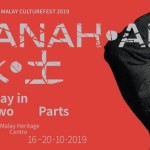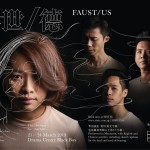“Kotor”
Reviewer: Teo Xiao Ting
Performance: 8 March 2019
Aqilah Misuary, despite her petite stature, stands as the most powerful person in the room. She hovers above a white pedestal, expressionless and goddess-like. Headlines of violent acts committed against women thatch the walls behind her. A black ring encircles the room, and three men (Ismail Jemaah, Mohamad Sufri Juwahir and KayKay Nizam) enter. They sway their bodies, stretch their muscles and unbutton their white vests. I tense, sensing danger even though I am safely seated beyond their touch. I become acutely aware that I am a woman. I begin fearing for Aqilah, anticipating violence. The men move around the black ring, distorting the circle as they pace.
KayKay reaches for the gunny sack resting against the white pedestal, and attempts to reinstate the circle with broken rice, dotted white and black. Ismail sneers, and the three men start to play. They oscillate between child-like movements, swatting at each other and prancing around the room in delight, and the taunting gaits of predators, lashing at each other with a barely veiled viciousness. Meanwhile, Aqilah’s hands move towards the soundboard; a shift – a taut synthetic note escapes the speakers that reminds me of marbles falling on the ground. The men jerk in response, but their movements feel involuntary.
Throughout the 90-minute performance, the men do not address Aqilah directly.
The sounds shift to a deeper tone, and Aqilah starts yanking the printed headlines from the walls, scribbling furiously in an attempt to speak, and fold them into paper planes. Her expression remains blank. She sends the plane soaring towards the men, but only KayKay notices. He approaches the paper plane, and cautiously – almost tenderly – unfolds them. He does not understand the scribbles, and neither do I. The inarticulate remains unreadable, and he holds the crumpled paper to the light. His body language becomes almost apologetic, and he bends to wrap broken rice with the paper, and sets the bundle on the pedestal as penance. What is he apologising for? Not noticing her presence earlier, or his inability to understand and relate?
8 March 2019 – the day I watched the performance – marks International Women’s Day. The day carries the weight of women who have been trying to speak for centuries, and I think of what this means in Singapore. Our discourse is nascent, but there is resonance with Aqilah’s gestures, and this is an attempt to bridge the gap. The physique of a petite woman against three muscular men is stark, and Kotor raises questions we don’t yet have answers for. Throughout the performance, Ismail and Sufri remain unapologetic, their bodies resistant and unseeing. Do they represent the men who are yet unwilling (or unable) to accept there is a distinct gap between how genders experience violence?
The embedded violence that haunts each of us ruptures when Sufri inhabits the stance of bharata natyam, a traditionally feminine dance form. We inhabit different physical bodies, but the imposition of the masculine and feminine draws a visceral reaction, a tentative materialisation of how the two can learn each other’s language.
I stay for the post-show dialogue, but found myself regretting the decision. The violence of prescribing a reading to the performance feels antithetical to the fluidity I felt during its course. It tells me that we are not yet there, and that we are still overly dependent on conventions to make sense of what perhaps need not be articulated cerebrally.
Kotor is pregnant, fizzling with references I understand instinctively. It is a call for men to participate in the conversation to eliminate violence, and restates the sentiment that women’s rights aren’t solely the responsibility of women. But as the post-show dialogue suggests, Kotor has yet to inhabit the assurance it tries to emulate.
Do you have an opinion or comment about this post? Email us at info@centre42.sg.
ABOUT THE PRODUCTION
KOTOR by -wright Assembly
7 – 10 March 2019
Rumah P7:1SMA, Stamford Arts Centre
ABOUT THE REVIEWER
Xiao Ting recently graduated from Yale-NUS College with a major in Arts & Humanities and a minor in Psychology. Her writing practice started with poetry, and has since moved towards a sort of explicit response. She’s still feeling out the contours of a “reviewer”, and thinks that each review is actually an act of love that documents and critically engages with performance.





